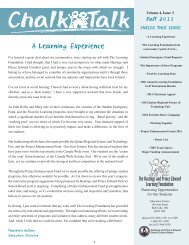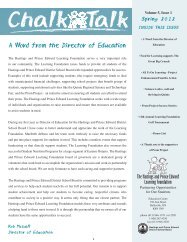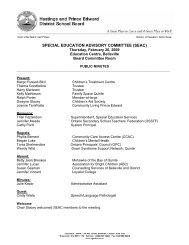Grade 11 Healthy Active Living Education Additional Supports ...
Grade 11 Healthy Active Living Education Additional Supports ...
Grade 11 Healthy Active Living Education Additional Supports ...
You also want an ePaper? Increase the reach of your titles
YUMPU automatically turns print PDFs into web optimized ePapers that Google loves.
Teaching Health <strong>Education</strong><br />
The <strong>Healthy</strong> <strong>Living</strong> units in the Catholic and Public grade <strong>11</strong> course profiles<br />
provide students with opportunities to acquire and discuss information related to<br />
healthy living. Due to the nature of the health topics, teachers should be aware of<br />
and be sensitive to studentsÕ needs, individual life circumstances, cultural beliefs,<br />
and values. Teachers should consider investigating appropriate community<br />
counselling and support services that are available for students and consider<br />
booking speakers from community agencies. Teachers should use a variety of<br />
media products when appropriate and read/preview them carefully for the<br />
presentation of accurate and up-to-date information. Role plays and scenarios<br />
are useful tools for students to practise living skills. Teachers should develop<br />
scenarios that are realistic and reflect studentsÕ needs. Where appropriate,<br />
teachers should be aware of the legal implications and the consequences of<br />
policies related to the health topics being presented. The teacher should frame<br />
each lesson by identifying the learning expectations and connecting and<br />
clarifying the assessment/evaluation strategies to ensure students have clear<br />
targets to work towards.<br />
Develop some tone setting activities to help students get to know each other,<br />
identify classroom expectations, and establish rules for discussion at the<br />
beginning of each healthy living activity.<br />
To facilitate class discussions about sensitive issues, teachers should be aware<br />
that their own deeply held beliefs, and those of their students, may be<br />
challenged. Preparation for such discussions requires thoughtful, sensitive<br />
consideration to ensure balanced leadership by the teacher and respect for the<br />
various points of view, which may be expressed.<br />
The role of the teacher is not to determine a ÒcorrectÓ position, but rather to<br />
ensure the provision of a positive, respectful, and supportive learning<br />
environment, which will encourage students to share their responses, explore<br />
issues, and express their concerns. Teachers should not offer personal opinions<br />
regarding belief systems. To ensure supportive and respectful dialogues,<br />
teachers should prepare students in understanding the concept of Òpoint of view.Ó<br />
As students experience opportunities to hear and explore diverse viewpoints,<br />
some of which may conflict with their own, the teacher can guide the<br />
development of the critical thinking skills necessary to expand perspectives.<br />
Teachers are encouraged to set the tone before beginning discussions regarding<br />
sensitive issues. Clear Òground rulesÓ for discussion with students should be<br />
established, taking the following into consideration:<br />
• everyone has the right to think what he/she wants; no one should try to take<br />
this right away<br />
• many different viewpoints may arise during discussions<br />
<strong>Grade</strong> <strong>11</strong> <strong>Healthy</strong> <strong>Active</strong> <strong>Living</strong> <strong>Education</strong> Supplementary Material (PPL30)<br />
Page 3
















